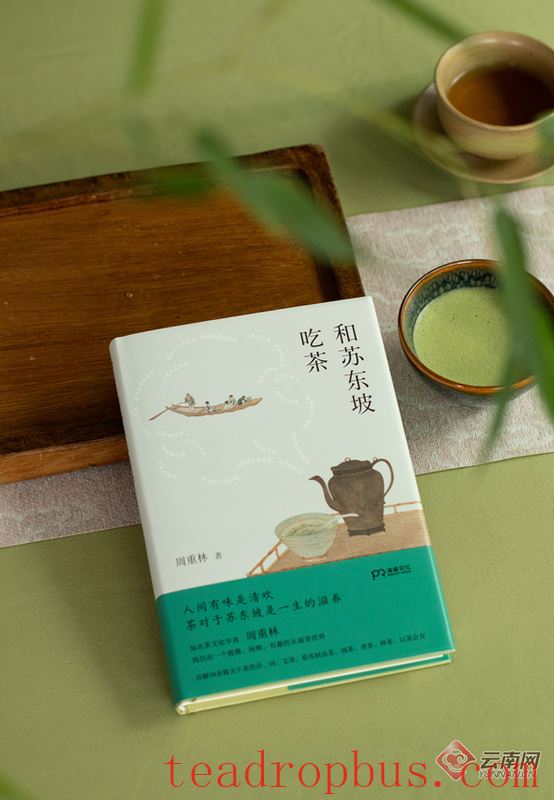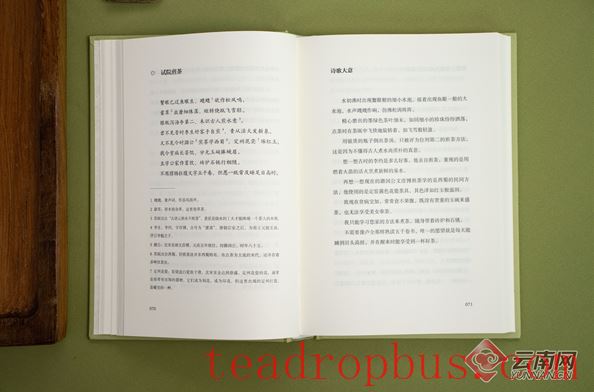“Foamy snow and milky flowers float in my midday cup, young and tender herbs grace my spring platter. The true taste of life is tranquil delight.” But why is tranquil delight the supreme taste of life? And what does this have to do with tea?
“Do not think of your old friends or your homeland; instead, try the new tea with fresh fire. Poetry and wine are for the prime of life.” What is “new fire”? And what was the new tea that Su Dongpo drank?
“In the bright light after a full sleep at noon, I imagine the new tea as white as milk.” So it seems that Su Dongpo enjoyed Drinking Tea after a satisfying nap?
What role did tea play in Su Dongpo's life? What were his thoughts and preferences regarding tea? By exploring Su Dongpo through the lens of tea, we uncover a world that is both familiar and full of delightful surprises.

Drinking Tea with Su Dongpo
Recently, renowned scholar of Tea culture, Zhou Chonglin, released his new book Drinking Tea with Su Dongpo. In the book, he meticulously analyzes over 50 poems, verses, and essays by Su Dongpo related to tea, complemented with authoritative annotations and modern translations, revealing a detailed, elegant, tranquil, and humanly warm world of tea associated with Su Dongpo.
Su Dongpo, a literary giant, was a connoisseur of life, encompassing music, chess, calligraphy, painting, poetry, alcohol, and tea. When discussing Su Dongpo's lifestyle, most people talk about his love for food and wine, but seldom mention his taste and interest in tea. However, Su Dongpo was indeed a great lover of tea, being very particular about tea leaves, water, tea wares, and even the company he kept while drinking tea. Tea was an indispensable part of his daily life, and his works are filled with references to tea. Su Dongpo's relationship with tea mirrors the flourishing tea culture of the Song Dynasty and the aesthetics of Song Dynasty life.
“Fine tea is like a beautiful woman,” is a well-known line cherished by literati and tea enthusiasts throughout history. Su Dongpo, a master of tea arts, believed that enjoying good tea was akin to encountering a beautiful woman. Comparing fine tea to a beautiful woman captures the beauty of language perfectly.
By opening Drinking Tea with Su Dongpo, introduced by the famous scholar of tea culture, Zhou Chonglin, we come to understand just how important tea was to Su Dongpo.

Drinking Tea with Su Dongpo
In the book, we learn not only that Su Dongpo liked to drink tea before and after his midday nap but also that he placed great importance on boiling water for tea preparation – the “new fire” mentioned in the familiar phrase “let us use new fire to Brew new tea” refers to charcoal fire with flames. He repeatedly emphasized the need to use lively fire, such as in “precious is the new spring water brought to boil by lively fire” (Boiling Tea in the Examination Hall) and “fresh water must be boiled with lively fire” (Drawing River Water to Boil Tea). The terms “new spring water” and “fresh water” refer to the water used for brewing tea, which should be fresh spring water or flowing river water to achieve the best flavor.
Su Dongpo was also very selective about his tea leaves. “Grinding dewy buds to brew snow-white tea” (Searching for Master Zhen on the Ninth Day and Then Sailing in a Small Boat to Master Qin's Courtyard). The term “dewy buds” refers to the tender shoots of tea that emerge in spring. “Casually tasting pre-rain tea from Jiaokeng” (Leaving an Inscription at Xiansheng Temple). Drinking the famous “Jiaokeng tea” wasn't enough; it had to be the first harvest before the Rain Water solar term. “Watching the fragrant cake being divided, golden threads, closely packed clouds and dragons” (Incense of Tea: A Tea Ode). Dragon-sphere tea was the top-quality tribute tea of the Northern Song Dynasty, which one could only taste if fortunate enough to receive a gift from the imperial court. Su Shi received a cake as a gift from the Empress Dowager, rejoiced, and wrote this poem to show off, but he couldn't bear to drink it, only admiring it from time to time.
“The true taste of life is tranquil delight.” According to Zhou Chonglin, the bond between Su Dongpo and tea, most desirable of all, is expressed in The Ballad of Washing Silk: “Light rain and slanting wind make the morning cold, faint smoke and sparse willows charm on the sunny beach. Entering the Huai River, the clear Luo River gradually merges. Foamy snow and milky flowers float in my midday cup, young and tender herbs grace my spring platter. The true taste of life is tranquil delight.”
In The Biography of Yejia, Su Dongpo explained the importance of purity to a person, saying that the life of tea is a quest for purity. Su Dongpo summarized his passion for tea as seeking a tranquil delight within it.
According to Zhou Chonglin, when using tea as a metaphor for a person, the most crucial aspect is “purity”; when using tea as a metaphor for life, the best taste is “tranquil delight.”
“For a long time, the development of Pu'er tea mirrored my own journey.” Speaking about the inspiration behind publishing this book, Zhou Chonglin said, “I became a tea journalist, then a tea writer, and eventually a tea scholar, all because of writing about Pu'er tea. At this point, my bookshelf contains over a hundred books by Su Dongpo. I told myself that it was time to view Su Dongpo from the perspective of tea, and to reflect on my own experiences along the way.”
“Compared to the warmth of drinking tea, studying tea culture can be very solitary,” Zhou Chonglin remarked. “Without a specific academic discipline or industry, there are no relevant books available in libraries or bookstores. Therefore, I began building my own tea library, buying books one by one, day after day, until now, I have nearly five thousand tea-related books. I changed my signature to: ‘drawing a circle to confine oneself, sitting in a well to observe the sky, and a narrow-minded opinion.'”
This might be Zhou Chonglin's tea world, as well as his “bias” towards tea.
As a scholar of tea culture, Zhou Chonglin has been studying tea culture for over 20 years. His publications include The Tea Wars, The Tea Empire, The Basics of Tea, Song Dynasty Tea: Elegance and Style, and 25 other books related to tea. The Guangming Daily refers to him as the “leading figure in Yunnan tea culture research,” and his articles have been selected for national college entrance exams and various regional exams across China. He excels at placing tea culture within the context of human intellectual history, giving his research a unique and innovative appeal.
In addition to being the official spokesperson for Yunnan tea and a leading researcher of Yunnan tea culture, Zhou Chonglin is also the vice chairman of the Kunming Online Literature Association and a network ambassador for promoting Kunming's city image. He says, “Being appointed by the Cyberspace Administration of Kunming Municipal Committee as a network ambassador for promoting Kunming's city image, as an ambassador, I naturally carry a mission. How to better promote tea culture and local culture is something I am currently contemplating.” Using his own efforts to gather the insights of many to benefit the many, the public service-oriented “Seeing Tea Culture Lectures” he initiated received recognition in the 2025 Yunnan Network Positive Energy “Five Hundred” Network Excellence Awards, the only one in the tea industry. Additionally, the “Tea Industry Revival” platform founded by him in 2014 was recognized as a positive energy account. Furthermore, the “Cat Cat Bookstore” opened by Zhou Chonglin and his wife in Xiongda Tea City, a large tea wholesale market in Kunming, provides a spiritual haven for many tea merchants, tea farmers, university teachers, and tea